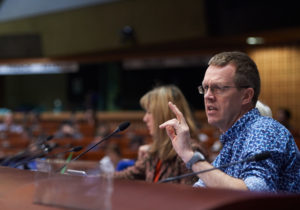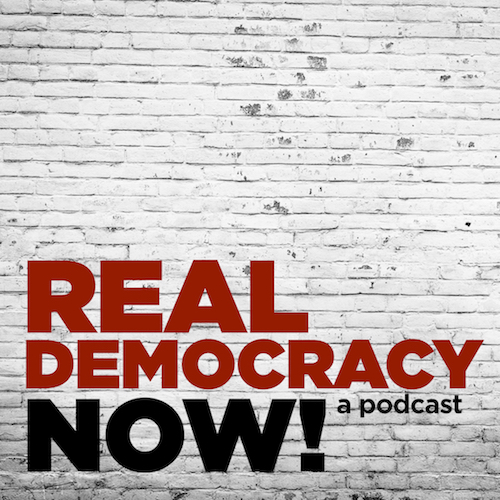Year: 2016
Democracy in Practice is an organisation dedicated to democratic innovation, experimentation, and capacity building currently working in Bolivia. Their mission is to transform how people envision democracy, and to develop innovative ways for even the largest organizations, communities, and governments to be truly democratic not just in theory or in name, but in practice.
Democracy in Practice are currently in their third year of school-based projects that reinvent student government, combining democratic experimentation with the a focus on providing young people with an experiential democratic education.
In this episode I speak with Adam Cronkright who co-founded Democracy in Practice in 2013. Before engaging in democratic innovation in Bolivia, his passion for democracy led to a broad base of experience, which included an independent study of the jury system; dialoguing with members of the 2011 Icelandic Constituent Council; co-facilitating two NYC General Assemblies; co-writing the Spokes-Council Proposal at Occupy Wall Street; and teaching and learning at the democratically-run Brooklyn Free School.
In the next episode of Real Democracy Now! a podcast I’ll be talking to Carolyn Lukensmeyer the current Executive Director of the National Institute for Civil Discourse in the US and founder of America Speaks. I hope you’ll join me for that episode.
- Keith Greaves, co-founder of Mosaic Lab, a Victorian based company focused on improving democracy through discussion and dialogue (@ 1.11).
- Lucy Cole-Edelstein, Director of Straight Talk, a NSW based company specialising in helping people understand each other (@16.36) and
- Max Hardy, Principal at Max Hardy Consulting, based in Victoria and works with leaders and organisations to achieve results through collaboration (@44.40).
Each of these facilitators has over 20 years experience working with communities and all of them are award winning facilitators of deliberative mini-publics.
With the growth in popularity of deliberative mini-publics there has been a increased demand for people to facilitate these processes. In today’s episode I speak to two such people – Emily Jenke from Democracy Co in South Australia and Titus Alexander from Democracy Matters the UK.
Emily Jenke has been facilitating community engagement processes for nearly years, most recently moving into supporting deliberative processes. Emily was in the midst of facilitating one of Australia’s largest deliberative mini-publics with 350 people considering the future of nuclear fuel storage in South Australia when we did this interview.
Titus Alexander is a facilitator, educator and community capacity builder. Titus trained the other facilitators for the two Citizens’ Assemblies that Professor Graham Smith described in Episode 8. He is also the author of Practical Politics: Lessons in Power and Democracy a text book on learning practical politics, which is aimed at encouraging students and lecturers to develop political skills to create a more inclusive, empowering democracy.
I have asked all of my guests what they think is the essence of a real democracy. In this episode I showcase their responses.
Professor Carson sees the essence of a real democracy as being about self government and trust.
Luca Belgiorno-Nettis, founder of the newDemocracy Foundation, agreed that people should be able to govern themselves.
Professor Janette Hartz-Karp from Curtin University in Western Australia highlighted the need to consider the common good co-designed by the people.
Peter MacLeod from MASS LBP in Canada talked about giving citizens a role between elections with more opportunities for citizens to be involved.
Associate Professor Helene Landemore from Yale University democracy talked about inclusiveness and equality, where everyone has an equal chance of being heard in decision-making.
Iain Walker, the Executive Director of the newDemocracy Foundation, doesn’t believe that democracy equals the vote, rather it should be about acting on the informed will of the people.
Professor Graham Smith for Westminster University sees citizen participation at the heart of democracy with citizens able to participate in critical decisions which affect their lives.
Emily Jenke from DemocracyCo, a facilitation company in South Australia, its about active citizenship.
Titus Alexander from Democracy Matter in the UK believes the public should have an equal say in public decisions.
Associate Professor Caroline Lee from Lafayette University identifies social, economic and political equality being more balanced as important in a real democracy.
Jay Weatherill the Premier of South Australia, like Janette, sees citizens acting in the community interest as part of a real democracy.
And Professor Gerry Stoker from Southamption University proposes a real democracy would be one that allows people to participate when and how they want to, what he calls ‘politics fit for amateurs’.
I’d love to know what you think is the essence of a real democracy. Please share you views with the Real Democracy Now! community on our Facebook page, by Twitter or on the website. Or you can send a voice memo to essence@realdemocracynow.com.au I’ll share some of your perspectives in later episodes.

Professor Graham Smith from Westminster University was part of a number of academics who designed and ran the Democracy Matters project in 2015. This project involved two Citizens’ Assemblies both considering devolution of local decision-making.
In addition to being demonstration projects around engaging everyday citizens in decision-making about local governance these two process involved slightly different designs to allow the academics involved to test the impact of having elected representatives as part of the Citizens’ Assembly.
Graham explains the background to these two Citizens’ Assemblies as well as the preliminary findings about the impact of having politicians as members of the Citizens’ Assembly South.
For more information about the Democracy Matters project visit http://citizensassembly.co.uk/home-page/about/
The newDemocracy Foundation is a is an independent, non-partisan research organisation here is Australia that aims to identify improvements to our democratic process with a focus on promoting deliberative mini-publics as a key democratic reform.
Iain Walker is the Executive Director of the newDemocracy Foundation and has designed and managed over twenty deliberative mini-publics for local and State Governments in Australia.
Iain explains the approach newDemocracy Foundation takes to the design of deliberative mini-publics generally and also sets out the example of the Melbourne People’s Panel a 43 person deliberative mini-public, involving both residents and businesses, which advised the City of Melbourne Council on their 10-year budget.
The newDemocracy Foundation makes all of their deliberative mini-public designs public on their website and recently designed and managed one of the largest citizens’ juries in Australia, the South Australian Nuclear Citizens’ Jury.
Peter MacLeod is the CEO and Founder of MASS LBP, a Canadian consultancy focused on democratic innovation and public strategy.
Since 2007, MASS has led some of the country’s most original and ambitious efforts to engage citizens in tackling tough policy choices while pioneering the use of Civic Lotteries and Reference Panels on behalf of forward-thinking governments.
MASS LBP has conducted twenty-five major reference panels, citizens assemblies and commissions for government involving more than 1000 Canadians and reaching 250,000 households. Cumulatively, this represents some 30,000 hours of deliberation on significant public issues, making MASS an internationally-recognized and unparalleled leader in the design and delivery of deliberative processes for government.
Peter lays out how MASS approach the design of the reference panels they conduct including how they explain the purpose of these processes, how the invitations are designed and the size of the groups.
He also takes us through a couple of processes they have conducted from the Residents’ Panel to Review the Condominium Act a multi-year process to update this piece of legislation to a hyper-local issue with Grandview-Woodland Community Plan Citizens’ Assembly.
And in case you were wondering LBP stands for Lead By People.
Professor Janette Hartz-Karp is a Professor in the Sustainability Policy Unit at Curtin University in Western Australia. As well as undertaking research in the area of democratic innovations Janette has lead numerous large innovative deliberative processes as community engagement consultant to the then Western Australian Minister for Planning and Infrastructure, Allanah McTernan, and more recently with the City of Geraldton.
Janette explains how she approaches the design of deliberative mini-publics focusing on three key elements: influence, deliberation, and representativeness.
Then she describes a number of processes she has designed and delivered including
- Dialogue in the City, a large process involving 1,100 people both randomly selected citizens and stakeholders, looking at future planning for Perth
- a Citizens’ Jury involving residents from two communities agreeing on the location of freeway exit after eight years of argument and disagreement
- an Enquiry by Design process to develop a Statutory Plan for Geraldton involving 300 people working with a multi-disciplinary design team responding to the participants’ input
- two participatory budgeting processes using citizens’ juries to make recommendations on 100% of 10 year Capital Works budget and 100% of the Operational budget of Geraldton Council.
Deliberative mini-publics are a popular form of democratic innovation around the world. In today’s episode I talk to a range of people to get their perspectives on what is behind this popularity.
Professor Graham Smith is a Professor of Politics in the Centre for the Study of Democracy, in the Department of Politics and International Relations at the University of Westminster in London.
Professor Janette Hartz-Karp, from the Sustainability Policy Unit at Curtin University in Western Australia. Janette is renowned nationally and internationally for her innovative work in community engagement and deliberative democracy.
Luca Belgiorno-Nettis, the founder of the newDemocracy Foundation in Australia. The newDemocracy Foundation is an independent, non-partisan research organisation aiming to identify improvements to our democratic process with a focus on promoting deliberative mini-publics as a key democratic reform.
Peter McLeod, the Principal and Founder of MASS LBP a consultancy focused on democratic innovation and public strategy. Since 2007, MASS has led some of the country’s most original and ambitious efforts to engage citizens in tackling tough policy choices while pioneering the use of Civic Lotteries and Reference Panels on behalf of forward-thinking governments.
Emily Jenke is the co-founder of Democracy Co a consultancy that works with governments, business, not-for profits and local communities to help them make better decisions together that improve the quality of people’s lives.
